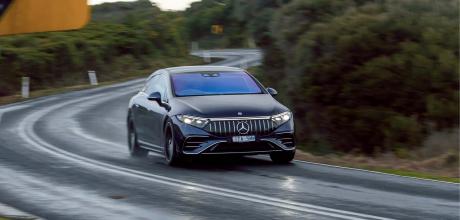Big test 2023 Mercedes-AMG EQS 53 4MATIC+ V297
What sort of electric future works for Australian drivers? Mercedes-AMG’s EQS 53 is the catalyst for a reckoning of where we are right now.
Change we can believe in?
MERCEDES-AMG EQS53 BIG DRIVE
Is an EV really a ticket to a green conscience? Enright heads to thepower source in search of answers
WORDS ANDY ENRIGHT
PHOTOS ALASTAIR BROOK
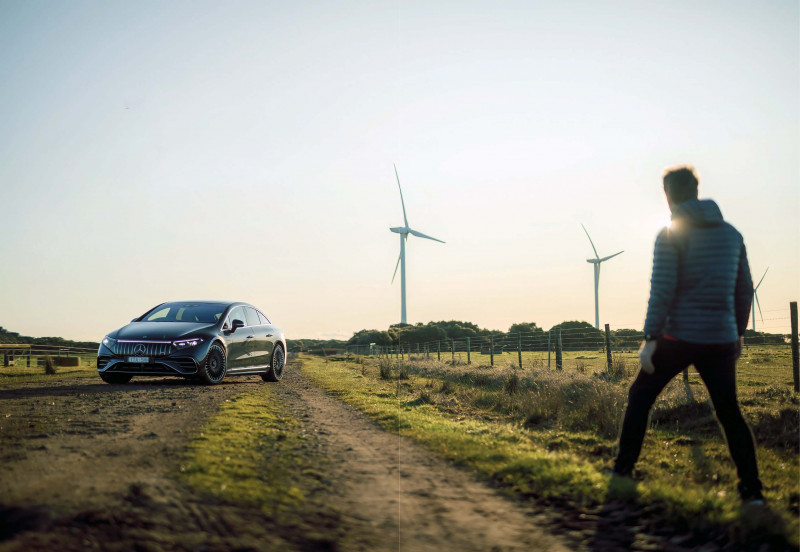
Crest the rise at Darnum and you’ll see it. At first it looks like a feathering of morning mist, but drive into the Latrobe valley frequently enough and you’ll know better. Trapped by the Baw Baw ranges to the north and the Strzelecki ranges to the south, the air quality at the Morwell East monitoring station today contains four times as much carbon monoxide and nearly eight times as much sulphur dioxide as the air at Geelong South. There are more than four times as many smoke particulates of 2.5 micrometres or smaller. We’re on our way to Australia’s dirtiest power station at Yallourn. It’s easy to feel slightly smug behind the wheel of the Mercedes-AMG EQS 53 AMG V297. Progress is serene and there are no tailpipes to emit anything that would trouble the lungs of the good folk of Moe as we give it an early morning juice up at the local 350kW ultra-fast charger. Yet Yallourn power station generates 13 per cent of Victoria’s electricity, so a decent proportion of the power humming down the DC cable into the sleek Mercedes is coming from a plant that, according to Climate Victoria, can chug 15 million tonnes of carbon dioxide a year into the skies over the Latrobe Valley.
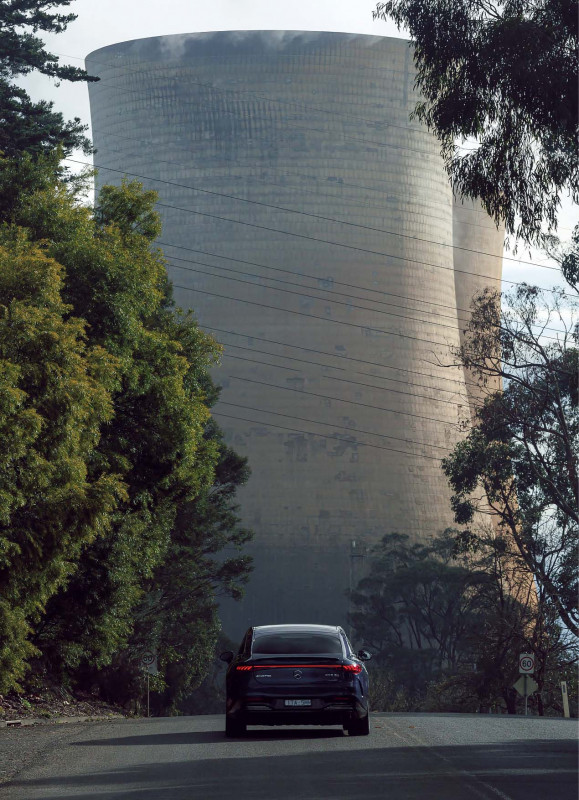
It’s a huge number. Let’s put it into perspective. According to the Australian Bureau of Statistics, we travelled 163m kilometres in passenger vehicles last year, averaging around 150g/km, which equals 24.45 million tonnes. So this one building appears to be emitting more than half the CO2 of every car in Australia per year. A 350MW battery is being built in 2026 for the Latrobe Valley and Yallourn will be decommissioned in 2028. That’s the good news. The bad news is that the second and third most polluting power stations in Australia, Loy Yang 1 and 2, are within eyesight and, if they are counted together, emit even more carbon dioxide than Yallourn.
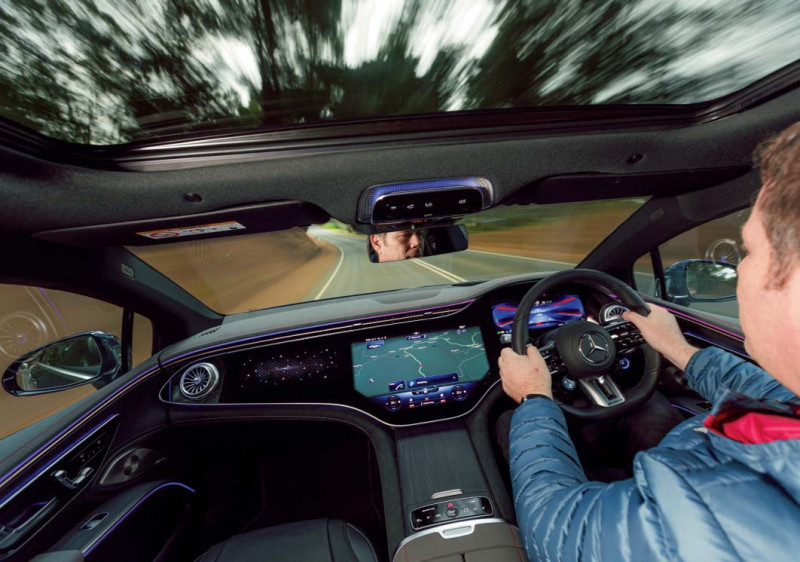
Still, none can hold a candle to the nearby Hazelwood plant. In 2005, it was the filthiest power plant in the world according to a WWF Australia report and was closed in 2017. The reason these plants have such a lamentable emissions record has little to do with their technology. It’s more a case of garbage in, garbage out. The local coal seams are of exceedingly low grade lignite, or brown coal, of which Australia has the second highest reserves in the world after Russia.
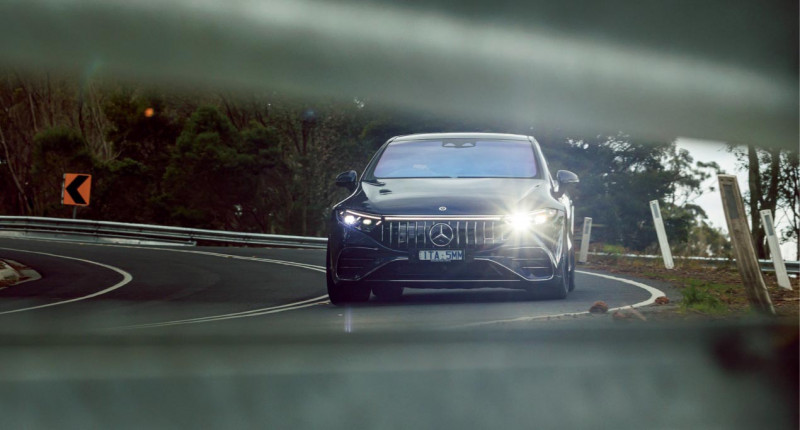
Created from peat in the period after the Chicxulub asteroid eradicated dinosauring as a viable career option, lignite is the lowest rank of coal and the Latrobe Valley’s lignite is of an especially problematic grade. Because of its younger age and shallow depth of burial, the Yallourn seam averages a very high 65 to 67 percent moisture content where it’s mined at Yallourn open-cut. It can’t be exported as a result but it is cheap to extract, with little overburden making the seams of up to 230m deep easily accessible.
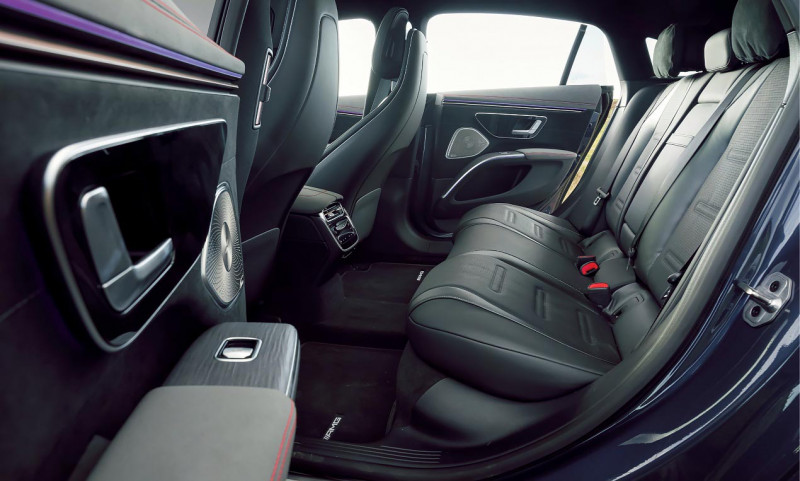
Fully charged with a lignite amuse-bouche, the AMG raises few eyebrows as we tool about Yallourn. The Solenite Blue paint finish is low key and while the numbers generated by this power plant are hard to digest, the EQS is also something that takes time to understand. Take the badge literally and expect an electric S-Class and you might well wonder what happened. AMG branding notwithstanding, it rides more firmly, the form factor is completely different with five doors rather than four, and there’s none of that beautifully considered blend of conservatism and progression that distinguishes the S-Class. Instead the EQS clobbers you with its modernity. Perhaps that’s no bad thing.
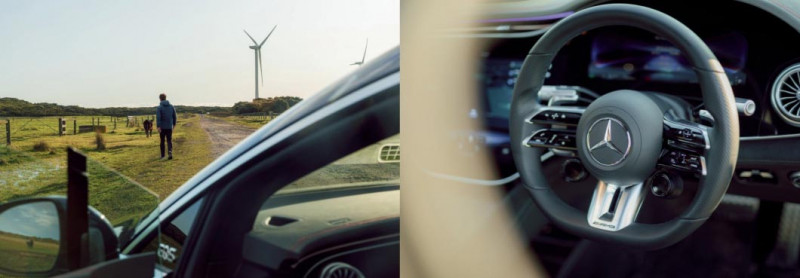
Mercedes has already played its hand with conservative steppingstone electric vehicles like the EQC. Its EVA 1 platform was an adaptation that could be built on legacy production lines. EVA 1.5, which underpinned vehicles like the GLA plug-in hybrid was the next step. The EVA 2 platform that sits beneath the sleek lines of this EQS will never see an internal combustion engine.
This EQS 53 version features a huge 107.8kWh battery pack and a pair of electric motors good for 484kW and 950Nm. Pay another $7960 and you can buy the AMG Dynamic Plus package which ups that to 560kW and 1020Nm, throwing in launch control and track pace app functionality. I have to question the point of paying extra. Any electric car which can accelerate to 100km/h in comfortably less than four seconds probably falls into the category of fast enough. You also need to ask yourself whether you really intend to immolate your tyres by throwing a 2.65-tonne luxury sedan around a circuit.
Right now we’re using zero kilowatts as we stand slack-jawed, gazing at the enormity of the largest open-cut mine in Australia. Some is beneath water, some is actively mined by a mechanised division of dredgers, travelling stackers and mobile slewing conveyors. Other parts are being returned to nature, bushland gradually healing the scars. The sheer scale of the industrial process as Yallourn’s three Toshiba reheat turbines hum in the background is hard to comprehend.
Drive south from Yallourn and it’s similarly dystopian. At one point, the horizons open up to reveal a landscape of logging clear cuts as far as the eye can see. The Strzelecki highway picks its way through a splintered world beneath a grey fly ash stratus. Here and there the dead fingers of a remnant tree point skywards like something from the battlefields of Ypres. We pass the historical marker for the community of Driffield, which became a ghost town when the SEC started acquiring local properties in 1980, hoping to build a mine and two power stations. The plans never went ahead, but the extension to the Morwell mine, and the accompanying diversion of both the Morwell River and the road we’re driving on effectively sealed Driffield’s fate.
The scenery improves as we glide silently into the hills of the Strzelecki ranges. This EQS might be Australia’s most powerful EV with a quoted range of 587km, but from my calculations of what we’ve consumed so far, 400km from a full charge looks a more realistic aspiration. Helpfully, the EQS displays its range estimation in best case, worst case and likely case scenarios on the 141cm hyperscreen that stretches wall-to-wall across the cabin. That measurement needs a little qualification as it’s the glass panel that measures 141cm, with three separate OLED screens behind. The passenger screen is only activated when the car detects someone in the left-hand seat. It’s a gorgeous piece of tech; easy to use and well integrated.
The displays also tell me we’re currently using 28kWh per 100km. Using the EPA’s calculation that one US gallon of gasoline is equal to 33.705 kilowatt-hours, that equates to 3.14 litres per 100km in a traditional ICE measure. Not bad for a vehicle that’s Porsche 911 quick yet weighs more than a modest tectonic plate.
After some servo fare at Mirboo North, we dip off the gently sinuous Strzelecki Highway and aim south. The roads here are twistier, more battered and patched. Even with the AMG ride control set into its softest suspension setting, the EQS 53 feels a little terse, the front pattering on mid-corner road repairs. With both air springs and adaptive dampers I’d hoped that its bandwidth would be wider in this regard. Driving for photographer Alastair Brook, I’m thankful for the nine degrees of rear steer which makes a vehicle with a wheelbase longer than a Land Cruiser perform an about-face in a diameter that would confound a Civic.
Before joining the open vistas of Gippsland cow country, we drop off the scarp at Loves Lane, a challenging series of well-surfaced bends. Tip the EQS in hard and at first the front end seems a little hesitant, the 22-inch Yokohama Advan Sports threatening to lapse into the sort of sledge understeer you’d expect of a vehicle with this sort of kinetic input. Keep the faith and they’ll hold their line, the driveline accepting an early and hard throttle application. Brook puts his camera down to sit and watch the AMG perform a pass. “It’s incredible,” he says. “Something that quick, making almost no noise at all. You could get up to all sorts of no good in it.”
My Four ‘N Twenty Traveller is threatening an encore after half an hour on the bends, so we wind things back and head south. I’m wondering whether the softer-edged EQS 450 that’s due soon might work out a better car than the more focused 53. Although the batteries will be the same, the AMG product features different bushings and suspension mounts, with motors with more windings, higher currents, upgraded inverters, more cooling and AMG-specific software to manage it all.
The i-Booster is also AMG-developed. This blends electric motor recuperation and friction brakes and, for the most part, feels agreeably organic, hardly bothering the six-piston composite front discs for mild deceleration. When available range dips below 100km, the EQS switches into a higher recuperation mode, which can make smooth driving in traffic a little trickier. Out here on these lightly-trafficked roads, the big Mercedes lopes across country effortlessly.
We track towards the beaches and largely deserted holiday homes of Inverloch, a rain squall interrupting photography duties before the skies clear en route to Wonthaggi. Finally, we catch a glimpse of our destination. The Wonthaggi wind farm features six wind turbines, each generating 2MW of clean electricity per hour, as long as the wind blows between 15 and 22m/s (54 to 79km/h), which it does on a fairly frequent basis on this coast. Do the maths and it’s clear that in order to put a dent in the hole in the generating budget that the closure of Yallourn will leave, a few more turbines are needed. After all, the filthy old Yallourn plant has the capacity to do the work of 725 of these windmills, assuming that they ran at full efficiency 24 hours a day, a patently unreasonable expectation. The conveyor belt of nasty lignite never sleeps.
Like the EQS 53 AMG, there’s a lot to wrap your head around now that we’ve reached journey’s end. None of the solutions are easy, and require a nuanced viewpoint. Yet that age old chestnut spouted by fossil-fuel proponents that, in Victoria at least, an EV user is just moving the problem from tailpipe to the even more egregiously belching cooling towers of places like Yallourn can be put to bed with numbers. Yallourn’s emissions will stop dead in 2028 when it’s finally decommissioned but the 14.4m tonnes combined from Loy Yang A and B contribute to 50 percent of the state’s base load and also acts as the hub for the undersea link to the George Town substation in Tasmania.
Decommissioning this is an altogether thornier proposition. Victoria’s renewable power sources comprise a third of its generating capacity, which is still better than Western Australia (31.5%), New South Wales (26%) and Queensland (19.6%). Only South Australia at 66.5 percent renewable and Tasmania at 99 percent allow EV owners a largely clear conscience. Yet, as ever, the devil is in the detail, with Victoria being the only state to rely on lignite for its fossil-fuel power generation. Fully 58 percent of Victoria’s power comes courtesy of brown coal; an utterly unsustainable statistic.
Plugged back into its AC socket at the office, the EQS53 had covered 384km on a charge, with an estimated 20km remaining range. Of the 102.41kW we used, 58 percent, or 59.4kW, was generated by some of the filthiest power stations on Earth. But here’s where the figures get interesting. For the sake of argument, let’s say all that power came from Yallourn. That station generates 1480MW/ hr, which works out at 411kW every second. That 1480MW/hr figure is the nameplate capacity of the station, and given that it responds to demand, we can factor in an industry-typical 52 percent capacity factor for a power plant of this type. Therefore, generating the 59.4kW used by the EQS 53 AMG over 384km would take the power plant 0.291 seconds, if we also add a five percent grid transmission loss.
So what sort of carbon dioxide emission does that equate to? If we factor in that 52 percent capacity, the Yallourn plant would typically emit 7.8 million tonnes per year, which equates to 72,111 grammes of carbon dioxide in 0.291 of a second. Given that this 72kg power-station emission will power an EQS 53 for 384km, it equates to a real-world driving figure of 188g/km. A petrol-powered Mercedes-Benz S580 emits 239g/km on the combined cycle and around 345g/km on the urban cycle which more closely represents the driving undertaken on our test route.
So even with your Mercedes being powered by the lowest grade fuel from the dirtiest power station in Australia, it’s still almost twice as virtuous as emitting it yourself from the tailpipes of an internal combustion engine. To hammer home the point, if, instead of just 58 percent, but all of your electricity was generated from lignite and all of that came from Yallourn, an EQS 53 would still emit less carbon dioxide than its petrol equivalent.
Granted, CO2 isn’t the only gas emanating from Yallourn’s smoke stack, but it certainly makes you feel a little less guilty about the Mercedes-AMG EQS 53. It’s no electric S-Class, rather something with its own personality and blend of qualities that takes a little time to key into. It certainly has a unique sense of occasion. But as much as it is intriguing and impressive, it’s hard to shake the feeling that Mercedes probably has an even better electric luxury car in it.
Of course, it will take some time to arrive, but the signs are that when it does make landfall here, Australia’s electric infrastructure will have markedly changed for the better. Whatever your politics, that’s change worth believing in.
Of the 102.41kW we used, 58 percent was generated by some of the filthiest power stations on Earth
TECHNICAL DATA2023 Mercedes-AMG EQS 53 4MATIC+ V297
- MODEL 2023 Mercedes-AMG EQS 53 4MATIC+ V297
- MOTORS Dual (front+rear)
- BATTERY 107.8kWh
- MAX POWER 484kW
- MAX TORQUE 950Nm
- TRANSMISSION Single-speed reduction gear
- L/W/H/W-B 5216/1926/1512/3210mm
- WEIGHT 2655kg
- 0-100KM/H 3.8sec (claimed)
- RANGE 404km (tested) 511km (WLTP claim)
- PRICE $348,400
- ON SALE Now
Enright rounds up some errant livestock at the Wonthaggi wind farm Should you want to feel a warm and fuzzy sense of virtue about your EQS, try moving to Tasmania.
Wie schnell bin ich?
Just how fast can the Mercedes-AMG EQS 53 charge? With charging times increasingly becoming a key differentiator, it’s worth noting that the peak charging power we were able to see on a 350kW fast charger was around 205kW at around a 30 percent state of charge. Charging from 20 percent to 80 percent would typically take around 27 minutes, after which rate of charge drops off rapidly. As it approaches 90 percent state of charge, the EQS’ charging power decreases to around 40kW. That’s about in line with AMG’s claim of 10-80 percent in 31 minutes. In other words, it’s quick but it’s not the last word in speed at the charger.
The back of the EQS is comfy, but it’s not a limo in which you’d take up residence in the rear
My Four ‘N Twenty Traveller is threatening an encore after half an hour on the bends
Victoria’s renewable power comprise a third of its generating capacity
Keep the faith and the Yokohamas hold their line, the driveline accepting an early and hard throttle application
Screen burn: three OLEDs under one piece of glass. We wouldn’t fancy applying much in the way of body flex through the big pane. Despite the almost total lack of body roll in this picture, the big AMG is cornering at a faintly shocking speed.
Frederik van Iterson came up with the first one-sheet hyperboloid shaped cooling tower back in 1918


